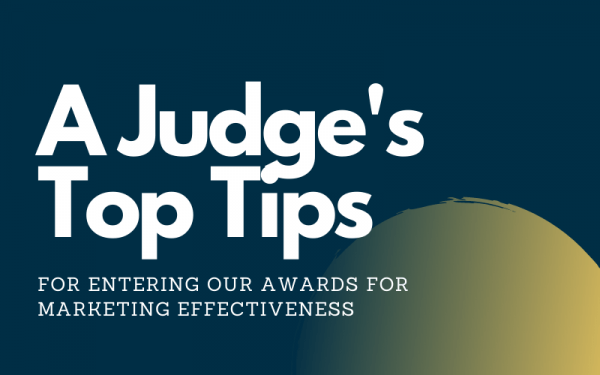With the deadline just around the corner, we asked Malcolm Oliver, marketing consultant, editor, business author and founding advisor of the Awards for Marketing Effectiveness to give us his top tips for writing a successful entry.
Having judged the Awards since their inception, Malcolm has a deep understanding of what ‘good’ looks like. Here are his simple pointers to help you maximise your chances of success:• Avoid using tired or meaningless clichés or hyperbole – world-beating, straining every sinew, working night and day, extraordinary, unprecedented, incredible, remarkable etc. If you describe something as “unbelievable”, the judges might just take you at your word!
• Read the questions carefully; use more of the word count for higher value answers, especially QQ6–7.
• Show us real evidence to support your entry – don’t just tell us that it was amazing, or your boss thought it was wonderful. Quantitative and qualitative measures can each be convincing – but make sure that they are relevant and credible.
• Be careful with – and show us that you understand – the use of statistics. Sales or profits or unprompted awareness may well (mathematically) have increased by 153.27%, but (given the uncertainties inherent in the collection of the base numbers) it is usually better and more convincing to say “about 150%” or “more than 150%”.
• Where possible, compare your performance with the market as a whole as well as the direct impact on your own metrics. A sales uplift of 25% may sound good – but not if the whole market has gone up by 30%. Conversely, falling short of your target may actually be quite impressive if some of your competitors launched major initiatives at the same time. Context is key.
• Think of the judges, and help them to understand your entry without having to refer to a dictionary or Google. The judges have wide-ranging but varying experiences of different sectors, markets and countries, so if your sector is niche or esoteric or new, describe it briefly in the introduction. For overseas entries, we ask specifically for up to 400 words summarizing your market.
• Be careful with abbreviations, acronyms and jargon, which can be very specific to a particular sector – or even just one company. You know what you mean, but will the judges? As a general rule, unless they are very familiar and self-evident (eg UK, FCA, ytd, ROI, SWOT) explain them at first use, thus: Account-Based (or Aesthetic Brand) Marketing (ABM).
• All our judges are human, so get all your facts across clearly – but try also to make your entry interesting for them to read. And remember that the judges base their marks strictly on what you have written in your entry – not on what they might know about your project or your company.
• It is fine to enter the same project in several categories, and it is fine to ”cut and paste” some of the core elements. But make sure that other parts are edited to reflect any different criteria for each category. For example, the same project might well be a successful new brand entry and demonstrate a corporate social responsibility focus, but the same metrics would not convince in both categories – and would not attract the best marks.
• Re-read your “finished” entry carefully, from the perspective of the reader, not the writer, and revise. Then ask a colleague or friend not connected to the entry to read it critically – and revise again!

